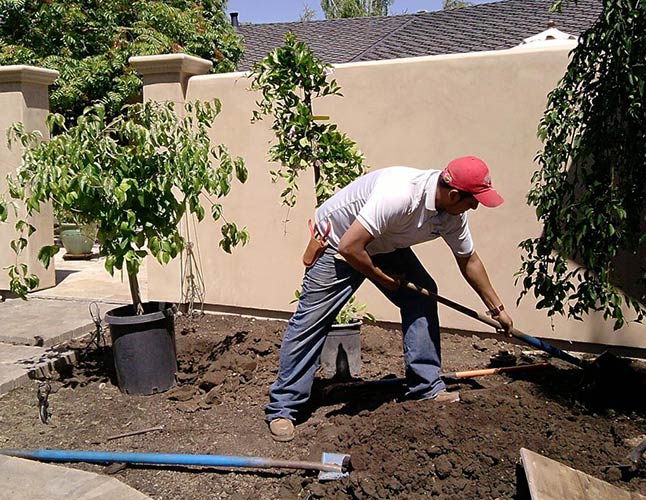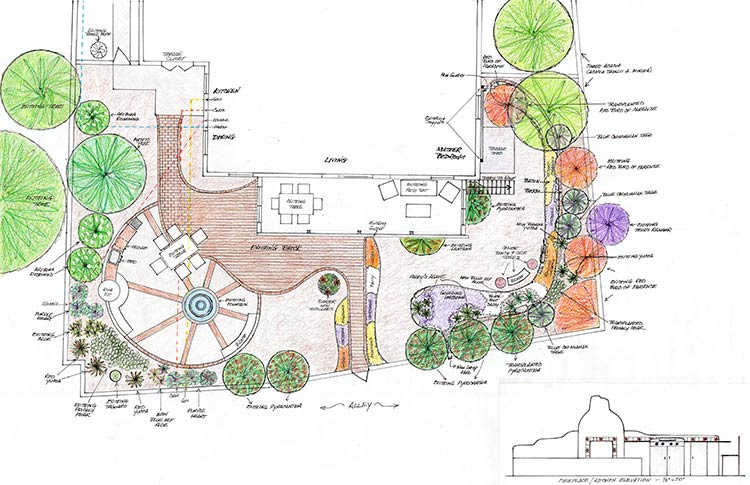
A beautiful landscape can add value to your home, but how do you choose the right landscape professional for your needs? There are four types of landscape professionals, each with their own areas of expertise. Understanding these distinctions will assist you with selecting the right professional for your needs. They include landscape nursery sales staff, landscape maintenance workers (often referred to as “landscapers”), landscape contractors, and landscape designers.
Landscape Nursery Salesperson
Landscape nursery professionals typically have a background in horticulture. Whether in school or on the job, this training allows them to help you select plants that meet your conditions. Most nurseries also offer products to fertilize plants or treat plant pests.
Need a small plant for a shady location? Want an evergreen screening shrub to create privacy? Want something low-maintenance? A nursery professional can answer questions about a plant’s sun and water needs, size, and care. They can help you select the right plant for the right place. This helps you avoid common mistakes like planting something that needs lots of sun in a shady place where it struggles or planting a little plant right next to your sidewalk, only to discover that it grows large and needs constant trimming.
Before you grab and plant, let a nursery professional teach you about the plant you have your eye on—or select something you’ll like even more!
Most nursery professionals do not leave the nursery to visit your site to determine its conditions, nor are they trained in design or construction to help with a major project. In addition, it’s important to find a worker who is attentive to your best interests, not just making a sale.
Landscape Maintenance Worker (“Landscaper”)
As the name implies, a landscape maintenance worker specializes in the care of existing landscapes, such as: pruning, weeding, mulching and clean up of debris. Because pruning is a specialty, it is important to hire someone with extensive experience as poor pruning can kill or stunt an otherwise healthy plant.
Landscapers are usually qualified to assist with planting a few plants in an existing landscape, but the are not trained in landscape design or construction both of which require specialized training and/or licensing. In most cases, a landscaper is not required by the state of Arizona to get a license as long as they’re only handling landscape maintenance and minor landscape repairs. It is important to hire a licensed contractor if you need construction, electrical or irrigation work (see below).


Landscape Contractor
As the name implies, a landscape maintenance worker specializes in the care of existing landscapes, such as pruning, weeding, mulching, and cleaning up debris. Because pruning is a specialty, hiring someone with extensive experience is important, as poor pruning can kill or stunt an otherwise healthy plant.
Landscapers are generally qualified to assist with planting a few plants in an existing landscape, maintaining plants, and doing minor irrigation repairs. They are not trained in landscape design or construction, including installing pavers, irrigation systems, or outdoor lighting. It is important to hire a licensed contractor if you need construction, electrical, or irrigation work (see below).
A landscape contractor is trained in construction, specifically regarding landscaping. They are required to be licensed in the state of Arizona. It is important to hire a licensed contractor as this protects you with the peace of mind of a warranty on their work, bonding should there be a construction accident on your property, the ability to get permits if required, and state arbitration in the event of a dispute. Landscape contractors are best used to execute a landscape plan and are qualified to construct barbecues, pergolas, and outdoor walls and to install plants, concrete, pavers, irrigation systems, etc.
Most landscape contractors are trained in construction, not design, although larger firms may have a landscape designer on staff. Often, “design” services are generic plans that can only be used if you work with their firm, leaving you locked in with that contractor and unable to shop for the best prices on implementing the plan. Although these designs are often represented as “free,” you should understand that their costs are built into the construction costs, often inflating the construction costs.
You should also determine if the contractor is providing a plan that is in your best interests, if the materials recommended are the most suitable for your needs and budget, or if they are left from a previous job and simply need to be unloaded. A landscape contractor makes more when they do a more elaborate landscape, It’s essential to feel that the contractor has planned with your budget in mind and has provided you with a contract that clearly defines everything that is included in the plan and that requires them to stay within budget and finish on time.
Landscape Designer
A landscape designer is trained in landscape design and often has some type of design education and/or certification. Although construction experience is not required, many independent designers started out working for contractors, and part of the design training is in construction techniques and materials related to landscaping design.
Landscape designers are also trained to conduct a client interview to determine your desires and goals, thoroughly assess your site, and take precise site measurements before beginning the design. All this allows the designer to create a beautiful, functional plan that meets your goals.
Plans are drawn to scale and ready to present to a landscape contractor. This gives you the freedom to get bids from several contractors and select the contractor that provides you with the best value. And during construction, the designer can act as your advocate to ensure that the contractor is implementing the plan as intended.
In addition, most landscape designers charge a flat fee based on the size and scope of the project rather than on sales of products or additional services, enabling them to focus on your needs rather than upselling. For these reasons, the typical design fee usually more than pays for itself in savings in construction costs.
